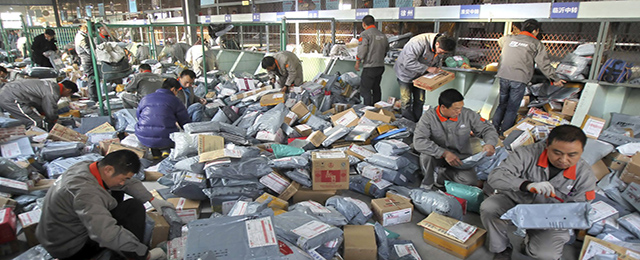Sales through Tmall, Alibaba Group Holding Ltd.’s shopping website, reached 10 billion yuan in the first 38 minutes of November 11, the day that serves as China’s e-shopping holiday and as the unofficial Singles Day.
Last year, Tmall needed nearly six hours for sales to reach that level.
Industry observers said that Alibaba may be aiming for 50 billion yuan for this year’s Singles Day sales, compared with last year’s record-breaking 36.2 billion yuan. The firm has never said so and has been trying to avoid setting any specific sales targets.
But the consensus is it needs a new record because this is the first shopping holiday since Alibaba went public in New York in September.
Sales through Tmall are not only a strong indicator of how well Alibaba has been managed. They also shed light on the health and growth potential of the entire e-commerce industry and even the country’s domestic consumption. Put in the context of the central government’s repeated emphasis on encouraging consumption and restructuring the growth model, how much Tmall sells in a day is much more important than it appears on the surface.
Both Alibaba and stores selling through its website have put a tremendous amount of effort and money into advertising and preparing for the big sales day, which offers a variety of goods at great discounts.
Much of the credit for turning an otherwise average early winter day into the world’s largest e-shopping spree goes to Alibaba. A few years back, a group of college students started calling November 11 Singles Day for those without a significant other and celebrated it in a self-deprecating manner.
Alibaba latched onto the trend, saying singles should go online to buy themselves a gift. In 2009, the first year of Alibaba’s promotion, only 27 e-stores participated and their sales were 52 million yuan. By the third year, sales reached almost 1 billion and pictures of mountains of packages to be delivered started making news.
Last year, Tmall said its Singles Day sales totaled 36.2 billion yuan. That dwarfs Cyber Monday in the United States and some other countries by a long shot.
But with the attention Alibaba also comes in for some criticism. Some have questioned orders numbers and others have doubt whether all goods sold on Tmall are genuine.
Cao Lihui, editor-in-chief of a newspaper in Zhongshan, a city in southern Guangdong Province where manufacturers and retailers of decorative lighting and other furniture are concentrated, posted messages on November 11 on Sina Weibo saying many companies were faking orders and transaction volume by purchasing their own products through agent companies.
He posted a photo showing dozens of mobile phones wired to two computers, and said it was taken at a company he knows that hires 16 employees to fake orders for companies on Tmall.
The company pays every worker 8 yuan for every faked order after the first 20, he said, and “because of huge demand, the price it charges has just grown to 55 yuan.”
Alibaba said the picture does not prove the phones were used to fake orders. Its media relations officer repeated something the company has said many times before: that Alibaba is firmly against the practice of faking orders and will punish violators by banning them from Tmall.
However, a sales person with a furniture and home decoration maker in Zhongshan told Caixin that “faking orders has never been a secret and you won’t get caught as long as you don’t go too far.” The company he works for participated in promotions on both Tmall and JD.com, another big e-shopping website.
Companies fake orders because Tmall ranks sellers based on their sales volume and only those with the highest numbers appear on the main promotion page where they get the most attention, Cao said.
Alibaba is also fighting its rivals over whether products sold on Tmall are genuine or counterfeit. JD.com is using a slogan for November 11 that roughly translates as “Same price, buy genuine.” It is also running an ad in which a young woman is embarrassed during a job interview when a new red dress bought online leaves marks on an interviewer’s couch.
Suning Commerce Group Co. Ltd., another retail giant, has also taken up the fight. It is running a series of ads that ask why people would want to buy fakes.
Neither JD.com nor Suning named Alibaba in their ads, but everyone knows what they are saying.
Alibaba has made some progress in fighting fakes, and Tmall is not accused of selling counterfeits as much as Taobao, which usually involves individuals selling to individuals.
“We have about 1,000 employees dedicated to screening for knockoffs, and we invite the police to get involved,” a source from Alibaba said, even while admitting: “Fighting knockoffs is a lasting battle that any platform must deal with.”






Be the first to comment on "China: ‘Singles Day’ sees record e-sales, but also some mudslinging"